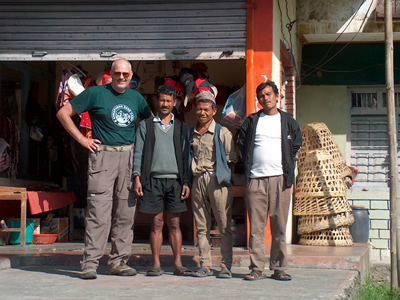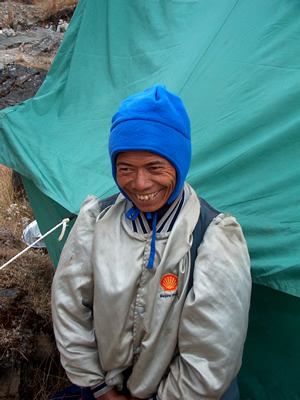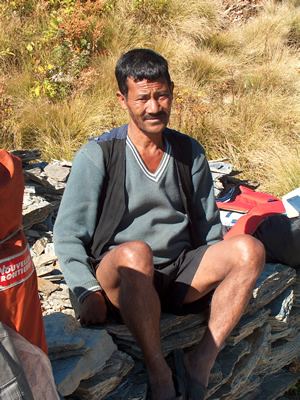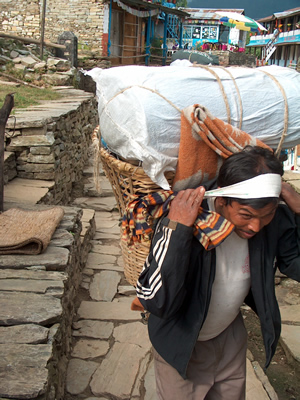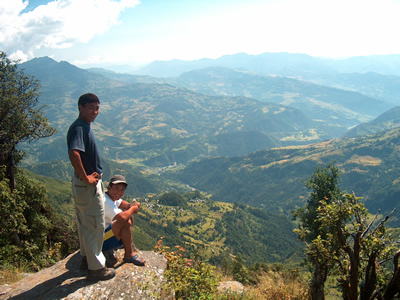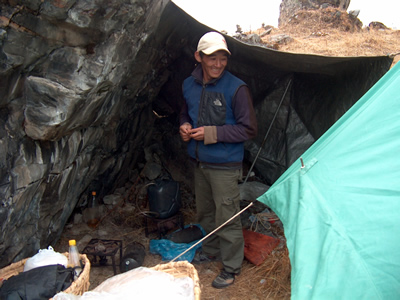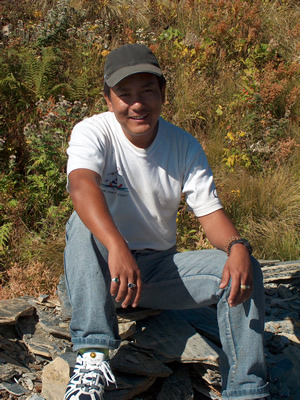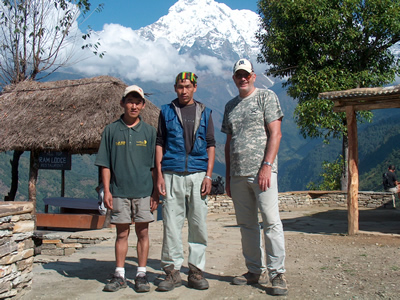I'd Like To Introduce The Guys In The Band
In the posts I've done so far on my trek in Nepal I have made references to the guides, cooks and porters who worked on the trip. Amazingly, my "solo" trek required a staff of six people. They did a lot of hard work for not much money to make my trek happen.
In the trekking industry the lowest level position is porter. There were three porters in our group. They were farmers from the hill country who come to Kathmandu in the spring and fall, the two main trekking seasons, to get work. Since there is no road network in the hills there isn't any way for them to sell any extra foodstuffs they produce. One of the few ways for them to earn money is to work on treks. Twice a year they leave their homes and families for about two months. Porters are unskilled laborers. None of the porters on our trip even spoke any english. They just have to be strong so they can carry a heavy load through the mountains day after day. A typical load would be about 40 lbs and that didn't count their own stuff that they needed to carry along. Most Nepalis are not big people either. Check out the photo where I am standing next to the three porters.
All of them were of the Tamang ethnic group and came from the Rolwaling area. I had trekked through the Rolwaling Valley on my previous trek. I didn't get to know them very well because of the language barrier. But I did get some idea of their different personalities.
Lokay kept pretty much to himself. He carried his load, helped set up and tear down camp, and otherwise I didn't hear or see him very much.
Sarkey was working on his very first trek. Because he was new he seemed to struggle a bit more. He had trouble balancing his load sometimes. He was usually the last one to reach a break spot or camp. But he was always smiling and happy.
By comparison Bouday was an old pro. Tasi called him an "assistant guide". He was always helping with camp chores. He usually took the lead in setting up and breaking camp. But his lack of english really limited him. Tasi had known him for many years. At one point when they were both porters Tasi signed up for english lessons and tried to convince Bouday to do the same. Tasi progressed to become a guide since then while Bouday essentially has stayed in the same place. Education is always important.
Whenever we stopped for a rest on the trail Bouday would drop his load and light up a cigarette. That's not the very first thing that I think of to do when I am gasping for breath from slogging up a steep hill. Since Bouday and Tasi were old buddies they were always going back and forth in nepali whenever we stopped and everyone would be laughing. I'm sure it was all really funny but I was always the outsider.
It was clear that the porters were quite poor. There clothes were very simple. Their footgear was just sandals. They didn't have any fancy hiking gear. When we reached Annapurna Base Camp, the one place that it was really cold, Sarkey didn't even have a warm hat. Since I had two I gave him my extra one. I wasn't getting any use from it and my wife thought it looked really dorky. Sarkey was glad to have it though.
The next step up in status from porter was cook boy. The cook boy would carry all of the kitchen gear and food on the trail. He would help with food preparation. He usually served the food in the dining tent and collected the dishes when I was done. And he did cleanup, a task I could really relate to.
Our cook boy was another Tamang named Metay. He was probably the tallest of the nepalis on the trip although still quite a bit shorter than me. He seemed to be the youngest of the group as well. He spoke a few words of english for the tasks that he did, words like "more?" or "finished?". But he didn't really speak enough for me to have a conversation. He definitely seemed like a happy go lucky guy though. He was always smiling and laughing around camp.
There was a little confusion about how to say his name. When I first asked Tasi he told me that his name was pronounced Me-Tie. But the first time that I called Metay by name he quickly corrected me and said that his name was Me-Tay. Later when I was talking to Tasi and referred to the cook boy as Me-tay Tasi assured me that it was Me-Tie. But Metay corrected me several more times. Finally Tasi acknowledged that his name really was pronounced the way Metay said that it was.
A few days later I found out why Metay might have been so insistent about how his name was pronounced. I was taking a picture of a young child in a village and she kept saying "Metai. Metai." Tasi asked if I knew what she was saying. When I said no he explained that she was asking for a sweet. Now I got it. "Tasi. I can't believe that for two days you had me calling the cook boy 'Sweetie'. No wonder he always corrected me right away!" I never did figure out if Tasi did it on purpose as a joke or if he really was mistaken about his name.
The next step up in the hierarchy was cook. Now that was a highly skilled position. With only two gas cookers and the pots and pans that we could carry, the cook had to produce all of our meals. For me he needed to know how to cook a lot of western foods. Then when I was done he needed to cook for himself and the rest of the staff. So he had a big job. And of course the cook always has to deal with complaints that people may have.
Our cook was named Lakpa. He was the only Sherpa in our group. He did speak some english so I was able to talk to him a few times. He was a farmer from the Khumbu region. He had a wife and a six year old daughter at home.
Lakpa really did an excellent job with the food. I am a pretty fussy eater and I liked everything he made. I thought it was delicious. He seemed really happy when I told him I thought he was doing a great job. As the cook I'm sure he has to deal with a lot of complaints. This trip was probably a real breeze for him compared to a normal trip. He could easily have been making meals for a dozen trekkers and as many porters. But on this trip he just had one trekker to worry about. And it made meal planning easier as he could just ask me whether or not I liked something. He didn't have to resolve any conflicting requirements which can come up very easily in a group of trekkers.
Because of his responsibility for meals Lakpa didn't have to carry a regular load. He just had a pack with his own stuff in it, although he did carry some food. And one important thing he did was carry the white gas for the cookers. He had it in plastic bottle that he always carried in his hand, since no matter what you put it in white gas always seems to leak. Every backpacker knows (or learns the hard way) that you can't put a bottle of cooking gas in your pack. It gets on everything and it all comes out reeking of gas. Even though the bottle was sealed there was always this smell of the white gas in the air when you were hiking with Lakpa. No reflection on his personality but I tended to stay a little ways away from him while we were on the trail.
Lakpa and Metay had a really important responsibility. Since they did all the food preparation and cleanup, it was up to them to make sure that they followed all the neccessary hygiene procedures. Sanitation is not very good in Nepal so contaminated water and food can be a real problem. It is easy to pick up some nasty intestinal bugs. These guys were very meticulous and I felt very safe eating on the trip, more so than I would have felt eating at various tea houses along the way. They did a good job and I didn't get sick on the trip. Even though I was carrying Cipro, I was really grateful that they took their jobs seriously.
There was definitely a difference between the guide and cook staff and the porters. Unlike the porters, the other nepalis tended to have typical hiking clothes and equipment, boots or running shoes, and nice packs. Some of it they could afford. A lot of the gear they got second hand from trekkers. I was talking to Lakpa one day and commented that he had a really nice Lowe Alpine Systems pack. "Nice pack. Second hand." was his response.
Tasi was the guide. He was also in charge of the staff but for a small trekking group like this it wasn't a big responsibility. On my last trip to Nepal with a dozen trekkers there were two cooks, two cook boys, four Sherpa guides and twenty five porters. Then we had a Sirdar, the nepali term for the big boss who was in charge of the whole group. But our group was relatively small and didn't require a lot of organization. But he was my interface to the rest of the staff.
Tasi would hike with me during the day. That was helpful as the trails were not always well signed. And when we were off the main path they weren't signed at all. In fact a few times they weren't even trails, just cross country routes. In general I don't like the idea of having a guide but this was more like hiking with a friend who was familiar with the route. I could just concentrate on the hiking and enjoying the scenery.
Besides hiking, we ate all of our meals together. That meant we had a lot of time to talk. Luckily Tasi spoke excellent english. I got to know him really well during that time. Other than people I met and chatted with briefly on the trail, he was the only person that I talked to for the whole two weeks. As my wife will attest, I can talk quite a lot. In fact, that was probably his biggest responsibility - keeping me entertained for the entire time. Definitely a tough job. It can be a problem if people don't get along on a trek because you are together constantly. But Tasi was an easy going guy and it was fun to hang out with him.
Tasi is also a Tamang. He was from the Rolwaling area but now lives in Kathmandu. He has a wife and two children - a boy and girl who are twelve and fourteen years old (if I remember their ages correctly - I may not be exact but I'm close). During the off season he stays in Kathmandu and works as a taxi driver. He doesn't really like living in Kathmandu. It's a crowded, dusty, dirty city with a lot of problems with water, sanitation, etc. but he stays there so he can send his kids to a private school. He expects that when they finish school he will move back to his village in the hills. He is anxious to get back to the mountains where life is simpler and his village where it is less crowded. I certainly understand his point.
We had discussions on a wide range of subjects. We talked about politics. Tasi said that he hoped Obama would be elected president because he thought that then America would work much better together with other countries. It is amazing how much damage President Bush has done to the image of the US with people around the world. Even in the remote hill country of Nepal. We even had scientific discussion. Although Tasi only went to grade school in his village he was very smart and extremely curious about things. So we had discussions about moon landings and climate change and all sorts of topics.
Tasi started as a farmer and worked as a porter on treks to support his family. Over time and with hard work he moved up to cook boy, then to cook, then to guide. He claimed he was still a pretty mean camp cook. Even as a guide he did not make a lot of money. Everyone on our trek made the same amount - 200 rupees a day. That's about $2.50 US. On the one hand I did feel somewhat guilty as that wasn't a lot of money to be paying for the hard work these guys did. But on the other hand it was clear from talking to Tasi that they were all really grateful to get the work. Times had been tough for the past few years. Because of the unrest caused by the Maoists in Nepal, the number of trekkers had fallen and unemployment had been really high. With the coalition government established last year things settled down and the tourists were back. Tasi said that people were optimistic that things were going to be better. Hopefully the looming worldwide recession will not set them back again.
I did end up giving big tips to the group at the end of the trip. I gave varying amounts but the total was more than their salary so they were all pretty excited.
I have to admit one effect that the whole low wages situation had on me. Along the trails all the tea houses sold Coke. It varied in price from 50 to 100 rupees. But I have to admit that I felt a little funny buying a Coke and gulping it down every time we stopped for a break when it cost about half a days wages for all the guys on the trip. So I limited myself to about one per day.
One of the best things about traveling is meeting people from other countries and cultures and getting to know them, especially on an extended trek like this where you are living and working together. The people of Nepal don't have a lot. The country is quite poor. But they are hard working, good natured, fun loving people who always seem to enjoy life. Except when you point a camera at them. Then they look as serious as can be.
I enjoyed their hospitality. It was fun to get to know them and I appreciated them sharing their beautiful country with me.
